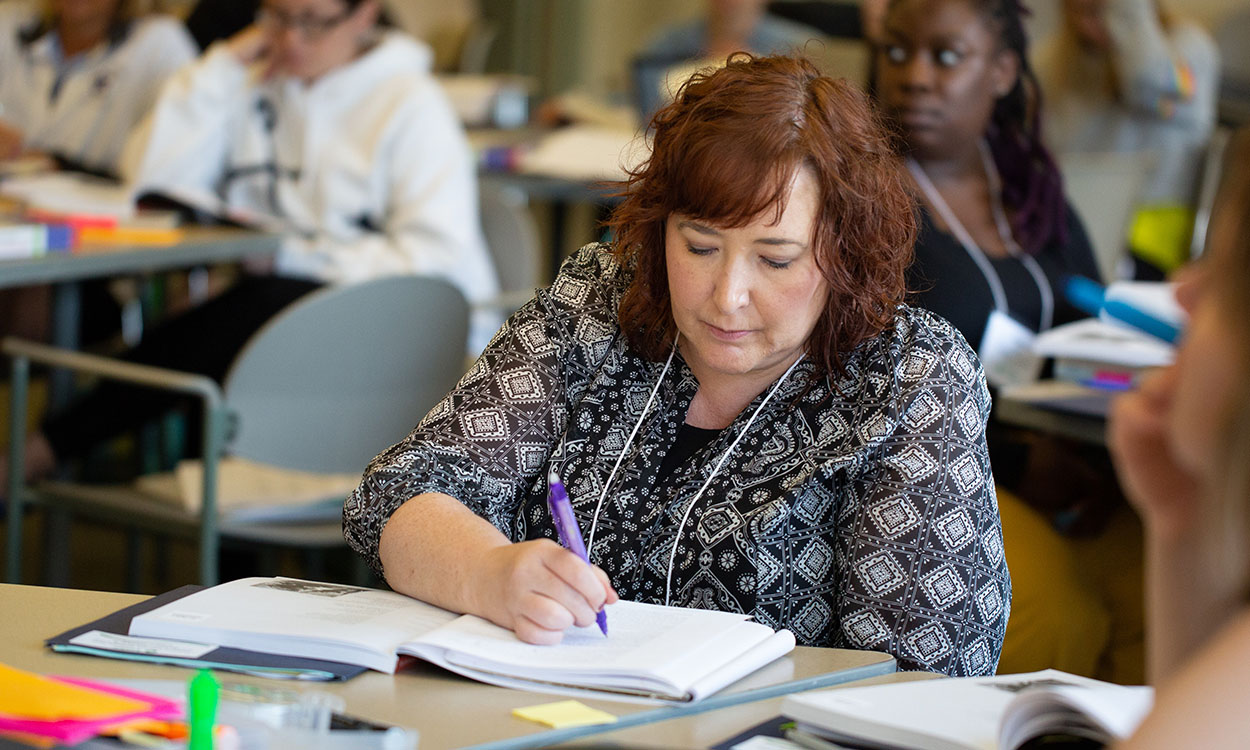Leadership in Literacy: School Leaders K-6

What every school leader needs to know about effective literacy teaching, coaching, and teacher leadership.
Learn how to support literacy teaching in grades K–6 in this 4-day training designed for school leaders including principals, central office administrators, literacy coaches and teacher leaders.
- District & School Leaders
- Literacy Coaches & Teacher Leaders
- Includes professional texts & materials
- Literacy Collaborative Affiliation Discount available
We will begin by helping you establish core values and beliefs about literacy teaching and learning that will be the foundation of your leadership in creating systemic literacy improvement.
Learn how to develop a healthy school culture that supports teamwork and continuous professional learning. With a strong foundation in literacy processing, assessment, and evidence-based instructional practices, you will be able to support instructional coherence for every child at every grade level.
In addition, you will learn how to promote shared ownership of data on student outcomes and address systemic structures that limit the learning of some students in the educational system.
You will learn how to support teachers in using the Fountas and Pinnell Literacy Continuum to plan for and assess teaching and how to guide them in developing their knowledge of the specific scaffolds needed for English learners.
Specifically, you will learn the essential elements of a variety of research based instructional contexts:
- Interactive read-aloud
- Shared reading
- Guided reading
- Book clubs
- Independent reading and writing
- Interactive/shared writing
- Readers’ workshop
- Writers’ workshop
- Systematic phonics, spelling and word study
We will discuss the keys to effective intervention for students who need additional instructional support and examine the short-term intervention, Leveled Literacy Intervention, which supplements classroom literacy teaching.
In each context, you will use observational tools so you can observe and discuss specific elements of high-quality teaching. You will expand your use of precise language to support reflective teacher practice by analyzing videos of teaching to understand effective instructional practices. In addition, we will address implications for in-person and virtual learning for each instructional context.
You will earn 24 professional development hours in this training.
Irene Fountas, Director of the Center for Reading Recovery and Literacy Collaborative

Irene is the Marie M. Clay Endowed Chair in Early Literacy and Reading Recovery, and is the author of many books. She is director of the Center for Reading Recovery in the Graduate School of Education at Lesley University. She has been a classroom teacher, language arts specialist, and consultant in school districts across the nation and abroad. Irene and co-author Gay Su Pinnell have published numerous books and resources with Heinemann. She has received numerous awards for her contributions to literacy.
Cynthia Downend, Assistant Director, Literacy Programs

Cynthia Downend has worked at the Center for Reading Recovery and Literacy Collaborative for over 10 years, serving in the roles of primary level literacy trainer and currently as the assistant director for primary literacy programs.
Cynthia has worked with many school districts across the United States to train and develop district level literacy staff developers, literacy coaches, classroom teachers, literacy interventionists and school administrators on a variety of topics related to improving literacy instruction.
Prior to her work at Lesley University, Cynthia held positions as a literacy coach, Reading Recovery teacher, and classroom teacher for over 20 years working in a variety of school settings including urban, suburban, and international schools.
Cynthia holds licenses in both elementary education and school administration, and achieved National Board Certification from the National Board for Professional Teaching Standards.
Cancellation Deadline & Refund Policies
Non-credit
You must cancel in writing two weeks before the start of the course to get a refund, minus a $50 processing fee. Email CRRLC@lesley.edu to cancel. If you are unable to attend, you may send a substitute at any time. Regardless of weather conditions, if the event is held but you cannot attend, you will be billed for the full amount.
Graduate Credit
To review the university’s cancellation and refund policies for credit bearing courses, click here.
Registration Deadline & Shipping Policies
The registration portal closes two business days before the first day of training to allow the minimum amount of time to ship training materials.
If you register within two weeks before the registration portal closes, you may incur additional fees for expedited shipping. You may still experience delays in receiving your materials.
Requirements for Participation
After the training, you will receive a certificate of attendance for your participation. To receive a complete certificate, participation during the specified times is required. Additional work may be assigned to meet the professional development hours.
Graduate Credit Option
With additional assignments and fees, this course can be taken for graduate credit. Contact CRRLC@lesley.edu to register for credit.
With Your Colleagues Option
We can deliver the School Leaders Seminar to your school/district. This option can be delivered virtually or in-person for a group within your school/district (as COVID-19 social distancing guidelines allow).
Fees & Policies
- Fees are determined by the number of participants and the duration of training.
- If applicable, travel expenses for each trainer (airfare, hotel, meals, and rental car) are an additional cost to be paid by the district.
- Professional development sessions that require extensive travel or overnight stays (if applicable) may incur an additional surcharge.
- If the number of participants exceeds the maximum, another trainer may be needed. This will increase training costs and travel expenses.
- Unless otherwise noted, fees do not include the cost of any required books or materials. The faculty trainer will consult with the district to select books based on the topics and the district’s needs.
- School districts in the same geographic area participating in the same training may combine their resources to meet participant minimums. Payment must be on one district’s purchase order.
For detailed costs, complete our online form to request this training for your school/district and we will contact you.
Interested in professional learning at your school or district? Schedule a meeting with one of our faculty trainers.
“From start to finish, this program has been useful. As a newbie to understanding literacy, I could not have asked for a more comprehensive immersion.”
Jerry Gregoire, Principal, SAU 101, New Hampshire
Featured Blogs
Bridging Languages and Building Literacy: Helping Multilingual Learners Thrive
Multilingual learners are taking on the dual challenge of learning a new language while also acquiring literacy. By taking small, intentional steps, teachers can effectively bridge the gap between students’ current knowledge and the new skills they are developing, creating a solid foundation for their literacy growth.
AI for Educators
How do we leverage AI’s capabilities to improve educational processes, and also maintain the human elements of teaching and learning? Our next Reaching All Learners Guest Speaker, Melanie Meehan, has some tips.
Planting the Seeds of Literacy: Cultivating Learning in PreK Centers
Teaching children how to use books and other literacy resources in play centers helps children naturally integrate the use of print, writing, and new vocabulary into their natural flow of play.


